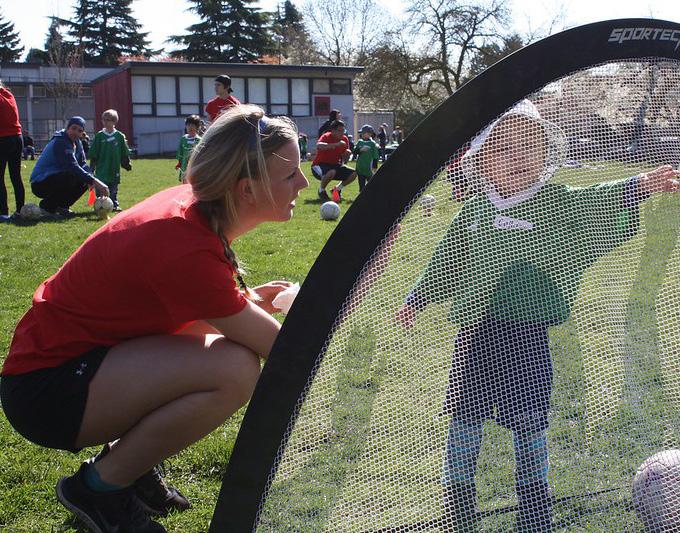Nurse violence
Nursing students fear the threat of physical attacks in the workplace. P3

Kid's gambit
Young players join chess tournaments in Vancouver as popularity soars. P8

Birds of a feather
Show-pigeon community is struggling to attract a new generation. langaravoice.ca

Langara students feel inflation
Bursaries, part-time jobs and scholarships aren't enough, anymore
By MEHARWAAN MANAK
Despite Langara offering bursaries and financial assistance, students find that it’s not enough to keep pace with the rising cost of living in Vancouver.
Stephen Busaga, an engineering student at Langara, receives tuition assistance from his family who run a grocery store in Romania.
“It is a significantly bigger challenge for my family to keep the business running at the same level,” Busaga said.
Busaga, like many international students, lives in shared accommodation and would like to have his own place in Vancouver. However, he said with the economic state and future of the country “that is virtually impossible.”
Flasher set to be released
Strict probation has been imposed after a year in
Aman convicted of a series of indecent acts at Langara and in the Lower Mainland is set to be released at the end of the month after serving a sentence of 30 days in jail plus time already served.
Charged early May 2022, Christopher Kumar Ram, 36, is expected to be released after almost a year in jail.
According to court documents, Ram pleaded guilty for masturbation in a public place on March 27, 2022, exposing himself to Langara staff.
He also pleaded guilty to indecent acts on the SkyTrain in New Westminster and in Richmond in April 2022, and in Surrey in October 2021. In addition, he pleaded guilty to violating supervisory orders, visiting a community centre and removing a monitoring bracelet.
Ram was given an 18-month probation order to start after he
is released. Conditions include a ban from any college, university or school campus without approval, a ban from Burnaby’s Foster Park, or from any park with a playground, and public pools and gyms without written permission from his probation officer. He is also prohibited from riding the SkyTrain or taking any public transportation without supervision. HWe must report to a psychiatrist for assessment and any treatment deemed necessary by his probation officer.
At Langara, there were two other incidents of a man exposing himself to students and faculty in March and April 2022, in the library, though no criminal charges ensued. Business and administration
Digital busking helps musicans

Students receiving financial aid from families abroad must also consider currency exchanges. Every Romanian leu his family sends him for school is only equivalent to 0.3 Canadian dollars.
Full-time second year business and economics student and full-time worker Abdalla Ahmed received a $1,255 bursary from the college this year but still can’t balance his budget. He currently owes $1,900 in fees to the college.
“Working full-time is quite a timeconsuming thing,” Ahmed said. “I have to make sure I make enough to cover the expenses as well as make sure [I] am on top of [my] studies.”
“All the free time that I have, I work,” said first-year science student Luis Lopez.
Lopez says that he is currently working three jobs while going to school full-time.
“If I find a job that can give me the work permit I definitely will drop the school because it’s too much,” Lopez said.
jail
student Anthony Herveary witnessed the aftermath of one incident. He recalls seeing police entering the library while he was on one of the upper levels and how upset the victims of the incident were.
“I still could remember it clearly … what I saw in their faces,” he said. “One of them was crying.”
At the time, he was unsure exactly what happened, but two days later he saw the incident on the news. He also recalls security comforting the victims and speaking to police.
Langara counsellor Michael Cheng said students affected by such events can seek counselling.
“An event like the ‘Langara flasher’ could definitely constitute trauma,” Cheng wrote to the Voice, adding it’s “a huge shock to the

nervous system, could be a trigger that reminds a student of past traumatic experiences that are similar. And of course occurred on our campus, which students regard as a safe space of learning.”
Ashamdeep Dhillon, protective services coordinator at Langara, said in an email to the Voice that Langara security policies have “not changed as a result of the incident.”
Dhillon also said extra security could be provided on the campus if deemed necessary. She also said students could download the Langara Safe app for easy communication with campus security.
Karanveer Singh, a web and mobile application development student, thought Paladin Security should hire more experienced workers. He also suggested student ID cards to tap into the library.
“It’s going to defame the reputation of the college if these events keep on occurring,” Singh added.

ONLINE SPECIAL
CAMPUS
SPORTS
PRODUCED BY LANGARA JOURNALISM STUDENTS | WWW.LANGARAVOICE.CA
MARCH 16, 2023 • VOL. 56 NO. 5 • VANCOUVER, B.C.
MEDIA AWARD TWO-YEAR WEEKLY 2021
PINNACLE|COLLEGE
“I still could remember ... what I saw in their faces.”
— ANTHONY HERVEARY, STUDENT
By TY LIM
EMMA SHULAR PHOTO
Many buskers are taking to social media and streaming websites. They have been able use these online platforms to expand their audience, create their brand, and build their own identity as musicians.
stand out P4
“All the free time that I have, I work.”
See langaravoice.ca for full story
— LUIS LOPEZ, STUDENT
Powell River resident affected by long-term firefighter shortage
City councillor says no full-time firefighters have been hired in many years
By MARILYN REICHERT
When Willow Baillie’s home in the Powell River suburb of Wildwood burned down in last December, it highlighted the coastal B.C. community’s ongoing problem with a shortage of firefighters.
After the fire, Baillie was dismayed to learn that Fire Hall No. 2, located across from her residence, has never had firefighters on site. It has always been staffed by volunteers.
“The current system is obviously struggling,” said Powell River Fire Chief Terry Peters. “Mrs. Baillie’s house would have been far less damaged if in fact that hall across
the street from her -- literally across the street – was staffed… She lost everything.”
Built in 1949, Fire Hall No. 2 has always been what’s known as a “paid-on-call” facility. Paid-on-call firefighters are volunteers from the local community who are paid to be trained to a professional firefighter level, but not hired as staff.
They are alerted by pager to local fires and paid to meet on location. This is a common costsaving measure in smaller towns where the property tax base is considerably smaller than in large cities.
Peters has been with the Powell River Fire Department for 36 years. When he was promoted to chief
in 2016, he knew the challenges regarding staffing.
“According to the National Fire Protection Act standards, four firefighters are required on a truck every time it rolls out the door,” Peters said. “We play Russian roulette with our staffing… if I get four, that’s a good day,” said Peters. “But most of the time, we are rolling out with two firefighters.”
Peters has brought the need for staff before city council on several occasions.
“It comes down to … firefighters cost too much,” Peters said.
Powell River Coun. Rob Southcott agrees there is a shortage, adding it has been “several years” since the municipality added full-
time fire positions.
“To be fully staffed, we are talking significant amounts of money because each firefighter is worth about $175,000 to $275,000,” Southcott said.
“They are very well compensated, which is a bone of contention between their union and CUPE which represents the other 90 per cent of city employees.”
“The biggest priority is to find more volunteers … The fire department is beating the bushes constantly,” Southcott said.
Ryan Thoms, manager of emergency services for the qathet Regional District where Powell River is located, said: “These are very small tax bases that support
these services. It’s a universal challenge, recruiting and retaining.” Thoms said there are eight fire halls in the qathet Regional District, which covers 5,000 square kilometres on the north Sunshine Coast and Texada, Savary, and Lasqueti Islands. But Fire Hall No. 1, the location of Peters’ office, is the region’s only hall equipped with career firefighters working two at a time on 12-hour shifts. The other halls are staffed with volunteers on pagers, Thoms said.
In Powell River, which has a population of around 14,000 people, “we don’t just have endless numbers of people to pull from, so we have to work really hard,” Thoms said.
Delta group to tackle 'troubling signs of poverty'
Consulting at the May 16, 2022 council meeting. The action plan was passed unanimously by the council.
“Certainly, we have a lot of work to do. We can’t do the work unless we know what the problems are, and we’re starting to get to that point now,” said Delta Mayor George Harvie.
By HANNAH ROWENA
MONDIWA
The City of Delta is working to create a more equitable community with the recent formation of a new citizen’s group aiming to improve the lives of vulnerable residents.
A presentation on Delta’s poverty reduction strategy and action plan was given by LevelUp Planning and
At the same meeting, former Coun. Jeannie Kanakos said: “I’ve been a resident of North Delta for a long time and I think really over the last five years I’ve seen an increase in very troubling signs of poverty here.”
In 2019, the B.C. government released the first annual report of TogetherBC, the province’s poverty reduction strategy, which stated that

B.C.’s poverty rate was 8.9 per cent the previous year.
Although Delta’s population earns more than the provincial average, the municipality’s poverty rate hovers at around 10 per cent, according to city stats
“Unfortunately, racialized and Indigenous communities are more affected by poverty as well. So as these communities grow, it’s important that we’re getting their input into what it’s like in Delta, specifically for them to live, or trying to live and thrive,” said Alex Atkinson, Delta’s poverty reduction and homelessness coordinator.
Atkinson said it was important all eight members of the Delta community voices table are Delta residents with lived experience with poverty.
Their input is expected to help improve existing services in the community.
“One really big function of the table is to act as consultants, and to make sure that decisions being made are involving folks who are impacted by those decisions,” said Atkinson.
“They know what works, they know what doesn’t work. They have nuances, what it feels like, they can speak to the mental health challenges that come along with it, food insecurity.”
Delta Coun. Dylan Krueger says poverty in Delta manifests itself differently than in other cities.
“Poverty and housing struggles come in different forms in communities like Delta. I think we’re just better at recognizing that now than
we used to be,” said Krueger. “And you know, you’ve got to look at Delta through a different lens than cities like Vancouver.”
Delta does not have a large population of unsheltered homeless people sleeping on the streets, Krueger said.
“But we do have a lot of people in precarious housing situations,” Krueger said. “People living on couches couch-surfing, people living in their cars, people who might be month-to-month on their rent, or they’re under-housed, they’ve got a big family, but they’re living in a space that’s too small for them.”
The Delta community voices table’s first meeting was Sunday, Feb. 26, and meetings are planned for the rest of the year.
2 Atlarge THE VOICE | THURSDAY, MARCH 16, 2023
The Baillie house, which is located across from Fire Hall No. 2 in Powell River, B.C., was destroyed by fire last December. MARILYN REICHERT PHOTO
Residents who have experienced poverty can share their opinions
Nursing students prep for violence
Workplace risks and culture put many on edge
By CALA ALI
Langara’s dean of nursing says the nursing program’s violence prevention course prepares students to identify potentially violent situations.
Anne Syme says that the mandatory course helps prepare nurses to reduce the risk of being harmed on the job.
“It’s important for students to be aware that when they enter this intimate space with people that there is both the opportunity for growth and healing, as well as they have to be able to protect themselves, should there be issues where that arises,” said Syme. Each week in B.C., 20 healthcare workers suffer from injuries due to violence at work.
Even though healthcare and social services workers account for 11 per cent of the workforce in B.C. they are involved in 57 per cent of all workplace violence claims, according to the Health Employers Association of B.C.
The violence prevention course was implemented to address the increasing violence against health-
Student research provides a leg up
Applied research arms grads with valuable skills, experience
By MATEO MUEGO
Research assistant Max
Besarab says that the experience gained working on projects, eventually showcased at Applied Research Day, gives students an advantage in the job market.
“The students who don’t have a diploma but worked in a lab will probably be prioritized,” said Besarab.
Max Besarab says he’s worked with his research team to collect, dry and analyze a new variety of feral hops.

“We’re focusing on comparing two methodologies right now, it’s like a solvent extraction, steam distillation,” said Besarab.
The applied research centre (ARC) funds research projects involving both students and instructors. These projects allow students to learn the process of scientific research while still attending classes.
Every semester the ARC has between 35 to 45 students involved in research projects.
There are four to six students in a group, each of whom are assigned a unique role. Students involved at the centre spend between two and seven hours a day working on their research projects while balancing their course load.
Besarab said working with Langara’s ARC puts students in a unique position for employment opportunities.
“It teaches you practical skills and ethics of the research, which will be beneficial if someone will continue into third or fourth year or into
masters and doing their own projects. And it gives insights into how the labs work,” he said.
Besarab said he has seen students get hired soon after working on research projects in the ARC because they have more practical experience in comparison to the average student.
Lydia Chau, a data analyst student, said learning these skills will prepare her for the future.
Although Chau says the subject of her project isn’t her chosen field, she says the opportunity has given her “good experience.”
Chau’s project, which focuses on helping Langara’s sustainability by creating a new system to identify types of waste and recycling, is an example of how a student can gain practical experience while benefiting the school.
“I would say it’s fun,” said Chau, adding, “And also it’s more related to our daily life.”
Kelly Sveinson, the director of ARC, said the work of students shouldn’t be underestimated.
“The work that [students] are doing has direct relevance to the community, the work that they do is real,” he said.
Sveinson said that the instructors have seen many students hired for jobs within their field of interest after graduation.
“Students are really keen on just developing their skills in the area that they’re interested in pursuing,” he said. “This helps students, once they get out of school, have kind of a network already or business experience.”
The Applied Research Day will take place March 23 in the A Building foyer and will involve 25 different presenters showcasing their ongoing research projects.
care workers in B.C.
The eight hour online course module teaches students how to anticipate and de-escalate potentially violent situations in the workplace.
Hazel Tan, a first year Langara nursing student from the Philippines, said the violence prevention course is important to learn to prepare students how to reduce workplace violence.
“I am afraid that some patients or even worse, workmates, will bully me when I get into the workforce,” she said.
Tan said that other nurses in the program who are new to Canada think the violence prevention course will help them gain a better understanding of dealing with patient violence.
Jennie Takata, a third-year Langara nursing student, said the violence prevention course teaches students to use situational awareness in order to deal with certain dynamics between nurses and patients that indicate if a patient is getting agitated or upset.
“Like, do I have a safe exit to the room? Is there anything they could throw at me? Is there anything
around my neck that they could grab?”
Takata said these are all things nurses learn to think about when learning with the violence prevention course.
Syme said by using the skills taught in the violence prevention course, students learn to be aware of the risks of a violent situation by studying how to anticipate violence and how to protect themselves through cues.
Syme said reminding students they are stepping into people’s space when caring for them is key.
“Understanding the relationship you have with the people that you work with, in all the ways,” Syme said.
During clinical experience learning, students learn in a small class size setting which allows instructors to have intensive oversight over their students’ learning, said Syme.

Once their training on nurse violence during their clinical experience is done for the day, students come together for a debriefing session. In these sessions, there is also a student mentor assigned to each group that can assist with any student inquiries.
“We’re very careful, particularly with first term students, we don’t want them coming into nursing with this sort of sense that they need to have self-defense skills,” she said.
EDITORS SAM HOLOMAY AND SETH FORWARD | THURSDAY, MARCH 16, 2023 | THE VOICE 3
Practice dummies set up for students to learn within the nursing simulation centre in the T building at Langara College.
CALA ALI PHOTO
Student Keegan Schmit places flags for his applied research project.
MATEO MUEGO PHOTO
“I am afraid that some patients...will bully me.”
Campusnews
— HAZEL TAN, NURSING STUDENT
“Students are really keen on just developing their skills.”
— KELLY SVEINSON, ARC DIRECTOR
Social media, streaming now a must to turn pro
Vancouver such as the one on Granville and West Georgia. Bell said it’s not enough to just be a musician; you need to be able to promote yourself, show that you are committed to growing an audience and interacting with people.

In addition, Bell started producing and releasing her own albums on streaming platforms like iTunes and Spotify.
“I think live performing and streaming go hand-in-hand,” she said. “Unless you’re big on Spotify, you won’t really get on algo -
Bell said in the end, busking is great for feedback on her performances and a useful promotional tool to draw attention to her multiple, self-produced


“The more you can do self-sufficiently, the better,” she said.

4 THE VOICE | THURSDAY, MARCH 16, 2023 | EDITOR VIRENDER SINGH
Enrico D'onfrio plays the accordion at Vancouver City Centre Skytrain station on most days. EMMA SHULAR PHOTO
Self promotion is proving increasingly crucial for street performers trying to get signed by a record label
Enrico D’onfrio has set up contactless payment along with the usual tip jar to diversify EMMA SHULAR PHOTO
A busker strumming on Robson Street. EMMA SHULAR PHOTO
Victoria-based musician Jordan Bell took up busking to attract more followers to her multiple self-produced albums. COURTESY OF MARK D’ANTONIO
Buskers are going digital
Now receiving tips by e-transfer and QR codes
Piotr Jaskiewicz printed out a QR code on an 18-inchsquare placard, set it next to the Vancouver Art Gallery steps, picked up his guitar and hoped for the best.
Jaskiewicz, who started busking in Vancouver a year before the pandemic, realized during the lockdown that he would have to embrace the digital economy.
Fewer people were using cash, and he didn’t have a digital tip option.
“I would say the bulk of my income has always been cash, but you know I see the trend going digital,” Jaskiewicz said. “I think overall
digital is a good way to go now.”
In an increasingly cashless world, buskers are beginning to diversify their streams of revenue.
Jaskiewicz said the more options he has as a busker the better, which is why he set up the QR code through The Busking Project, a platform committed to promoting street performers.
According to a report by Payments Canada, electronic transactions have risen by more than 20 per cent since the pandemic started.
Public busking programs like TransLink’s and Granville Island’s were temporarily suspended due


to safety concerns during the lockdown.
With bills and coins being possible carriers of disease, the tap-to-pay option seemed safer.
Jonny Tobin, a professional musician, who shifted to digital performances when COVID-19 hit, continues to busk as a side hobby.
“I taught myself how to do live streaming. Got all these apps and figured things out, figured out a good setup,” Tobin said, adding that he set up a PayPal account as a “virtual tip jar”.
Musician David Morin said while digital tips are good to have set up,
he prefers accepting cash tips while busking on the streets.
“When people see an open guitar case, they just put money in it and it’s faster and more streamlined,” he said. “And there’s, like, a certain nostalgia, I think that goes along with that.”

Morin began busking to jumpstart his career until the pandemic motivated his shift to livestreaming on portals like Reddit and Twitch.
“You kind of have to be tapped in and know what platform is doing what,” Morin said. “It’s really frustrating because I just want to make tunes, you know.”
5 News&features
By EMMA SHULAR
Often seen outside the Metrotown SkyTrain station, this busker displays his email address so you can e-transfer him. VIRENDER SINGH PHOTO diversify his streams of revenue.
her Spotify profile and promote her
Digital pay for buskin'

Passengers heading home from work can often hear the faint tunes of a guitar floating over the crowds of the SkyTrain station. Who doesn’t appreciate a musical interlude to offset the tediousness of life?
OPINION
When we walk past talented musicians, it is easy to take a moment and enjoy the music. When it comes to tipping, we regularly find ourselves coinless in an ever-increasing cashless world.
Buskers deserve to be tipped and we need to be prepared to tip them using digital cash tools.
Busking is having a transformative moment as the world hurdles down the digital path. It too is shifting from receiving the flipped two-dollar coin into a hat or case, and adapting to the use of QR codes or e-transfers to receive payments.
While some musicians have posters with a variety of digital-giving options, the transient audience, who are frequently in a hurry, are not always prepared for the changing giving patterns. Transferring money by phone makes some in the community uneasy. But one doesn’t need to be afraid of the digital changes. Just turn on your phone, take a photo of the QR code and from there, go online to make the transfer. Busking is often a fun way for musicians to show off their talents. It can be an effective way for music artists to build their confidence or kick-start a music career – a way to get their sound out there.
Now with the increase in the cost of living, busking for tips has become a source of supplementary income for many street performers.
Not all musicians have progressed along with the digital movement. Does the saxophone player focused on his music-making outside the SkyTrain station feel discouraged when he glances down to an empty tip jar?
If you are a musician who loves to busk and you’re missing the cash, there are websites available to help musicians create a payment system in our card-tapping society.

Hopefully our cashless world will not penalize the talented musi cians who live and work among us – the ones who turn our mundane commutes into moments of pleasure. Keep those musicians playing their tunes. Don’t let the music die.
Time to care for the carer
When we think of the professions most exposed to violence, we think of police officers, security guards, and corrections officers. But it is the nurses that dress our wounds, give us medicine, and manage our care when we are sick and vulnerable who are in even greater physical ment. Of the jobs mentioned, the most dangerous is not the one that routinely polices violent criminals. against nurses account for 31 per of all injuries from acts of violence in British lumbia,the BC Nurses
You may expect to see that physical injuries are common among law enforcement officers.
OPINION
It is estimated 93 per cent of all nurses will encounter some form of physical assault in the workplace, according to the Canadian Federation of Nurses Unions. This rate of violence will cause a third of all new nurses to leave the profession after the first year on the job said the Canadian Federation of Nurses Unions. This will result in fewer nurses being available to provide care at hospitals, leading to more healthcare issues. But instead of blaming long waits at hospitals or the government for not funding the healthcare system, we would only need to blame ourselves.
To prepare nurses for this eventual life outside of their nursing schools is an eight-hour course by Langara College, giving tips and tricks on defending yourself.

This might seem like an excellent idea, but this is like having somebody watch a Gordon Ramsay cooking tutorial and then expecting them to be able to work in a professional kitchen. More than that will be needed to fully prepare anyone for anything, and nurses leaving school will be expected to deal with difficult dangerous situations and people. It is simply adding a Band-aid to the problem.

In October, the Provincial government of British Columbia decided to step in and offered to employ around 334 protection officers to guard nurses. It could be a good idea, but it has been much ado about noth-
ing so far. The announcement was in October 2022, and as of January, it was reported on the CTV website that only four had been employed. That is garbage. It should not take a whole winter to hire enough security guards who can protect our caregivers. Hazel Tan, a secondyear nursing student the Voice spoke to, said that she fears being physically abused by co-workers and patients at her workplace. Instead of hospitals being places of healing, they have become places of harm, where nurses no longer feel safe. There is something we can all do to make nurses’ working lives safer, and it goes beyond banging pots and pans. We can treat these guardians of health, these helpers of the sick, with the respect and support they deserve.

Viewpoints 6 THE VOICE | THURSDAY, MARCH 16, 2023 | EDITOR TOM ELEY CONTACT US Online at langaravoice.ca Twitter @LangaraVoice The Voice is published by Langara College’s journalism department. Editorial opinions are those of the staff and are independent of views of the student government and administration. We welcome letters to the editor. They may be edited for brevity. Your letter must include your name and phone number. HOW TO REACH US PHONE 604-323-5396 E-MAIL thevoice@langara.ca WEBSITE langaravoice.ca DROP-IN Room A226 Langara College SNAIL MAIL The Voice 100 West 49th Ave. Vancouver, B.C. V5Y 2Z6 INSTRUCTOR Erica Bulman MANAGING EDITOR Marilyn Reichert PAGE EDITORS PAGE 1 River H. Kero PAGE 2 Neil Amsler PAGE 3 Seth Forward Sam Holomay PAGE 4 & 5 Virender Singh PAGE 6 Tom Eley PAGE 7 Shashi Goel PAGE 8 Andrea Dante MANAGING WEB EDITOR Tom Eley WEB EDITORS Seth Forward Nicholas Naylor Joyce Liew Nils Rummler Marco Shum Hannah Rowena Mondiwa Clarissa Kurniawan Kalvin Moses REPORTERS Cala Ali Milica Anic Thea Catipon Erin Conners Roy Fang Ty Lim Meharwaan Manak Mateo Muego Emma Shular WE WANT TO HEAR FROM YOU Have a different point of view? Write us. Journalism instructor Erica Bulman oversees The Voice. Email: ebulman @langara.ca
nurses feel they are not safe in their workplace and this could result in an exodus from the healthcare industry. ILLUSTRATION BY RIVER H. KERO
Many
“It is estimated that 93 per cent of all nurses will encounter some form of physical assault.”
MARILYN REICHERT
TOM ELEY
Hope for South Vancouver skateboarders
CitySkate strategy adopted by Vancouver Board of Parks and Recreation
By MILICA ANIC
Although South Vancouver has no skateparks despite skateboarding’s increasing popularity, skateboarders are hopeful that a city strategy will encourage new skateparks and indoor facilities.
South Vancouver had an indoor skate facility for nearly nine years. Located in an industrial area on Ontario Street near the Fraser River, the Dryspot Indoor Sk8 Park operated from 2009 to 2018.
Operated by Ben Chibber, the owner of Monké Skateboards in South Vancouver, it was the only indoor facility in the city. But since Chibber was not licensed to run an indoor skatepark, the city told him to shut down the indoor facility.
“It was such a big deal, people

loved my spot,” Chibber said. “I was servicing the community.”
Chibber said it was the best he could do for South Vancouver and does not believe an indoor facility is feasible.
But as of 2022, the city has a longterm plan to increase skateparks throughout Vancouver in a fair and equally distributed manner, said David Harrison, senior communications specialist at Vancouver Board of Parks and Recreation, in an email to the Voice . The CitySkate skateboard amenities strategy, adopted by the board in 2022, seeks to create “a well-connected network of welcoming skate amenities and addresses the significant service gaps throughout the city,” Harrison said.
The CitySkate plan identified the South Vancouver area as a priority
location for a new skatepark. The plan includes the establishment of a new skatepark in the Cambie Corridor district as well as a new park in either Marine Gateway or East Fraser Lands, as those areas become more densely populated, Harrison said.
“Regarding indoor skate facilities, during engagement on the CitySkate strategy, we heard from the public that an indoor skate space is a high priority for Vancouver’s skateboarding commu-
nity, and we intend to prioritize this piece as we work to implement the identified actions,” Harrison said. Chibber said if the skateboard community wants an indoor facility in South Vancouver it needs to find an unused building. The CourtsSkateboard Park, an extremely popular spot in East Vancouver, was made into a do-it-yourself outdoor skatepark from an unused tennis court and is now maintained by members of the skating community. “DIY skateparks are unique
More mess leads to more stress
year for available rentals, according to online rental listing data compiled by Liv Strategies Inc. The average asking rent was $2,208 for an unfurnished, one-bedroom unit for March 2023, compared to $1,856 in March 2022.
Sixty-eight per cent of Canadian post-secondary students who experienced depression said that it negatively impacted their academic performance, according to the 2022 National College Health Assessment survey.
because the design of them and the management of them is rooted in the community for more of a grassroots initiative,” said Oliver Tennant, a volunteer with Britannia Skateboard Committee.
DIY skateparks can be reconfigured by moving wooden ramps and obstacles to create either more advanced or beginner friendly spaces, said Tennant. The skaters can move ramps, boxes and ledges to create a new park each time.
“So that ever-changing ability is something that keeps [the park] fresh,” said Tennant.
“We were teaching skateboarding ... Because there's so much activity going on in skateboarding, a lot of creative people like to skateboard and express themselves that way,” said Chibber.
PSYCHOLOGICAL DISTRESS LEVELS
Students wanting to tackle their cluttered living spaces should forget about perfection and focus on what works for them, experts say.
Khaled Bayyari, a first-year business student diagnosed with attention deficit hyperactivity disorder, moved out of his tiny studio apartment in Gastown last semester because he couldn’t get anything done at home.
“The kitchen, bedroom and workstation were all in the same room and yeah, it wasn’t a fun time,” said Bayyari.
Rising housing costs have put pressure on the amount of space students can afford. The average rent-persquare-foot in Metro Vancouver increased 14 per cent over the past
Although the Hastings-Sunrise basement suite Bayyari moved into has more space, he said he still struggles to keep it tidy.
“Sometimes I fall into that trap of, like, I don't want to do the dishes today,” Bayyari said. “If my room isn't clean, if I have a big pile of laundry on my bed, I'm gonna think about it all day and I'm not going to be able to put my 100 per cent in.”
Dr. Sheila Woody, a psychologist and University of British Columbia professor, said although more research needs to be done, clutter is stressful and distracting when someone desires a tidy home.
Woody said conditions like depression can hinder someone’s ability to take care of their space because of “really low energy levels and low motivation.”
Woody said the heightened stress of exam periods can create similar problems for all students because prioritizing what to do becomes more challenging. While it is difficult to manage clutter in small spaces, Woody said different people have different ideal living environments.
“As long as the home is safe, then people should be able to kind of choose the aesthetic that works for them,” Woody said. “The idea that your home should look a certain way might create stress, or shame or embarrassment when people come
over, the reality is it's just hard to live that way in that amount of space.”
Anna Dolgopola, a home organizer and second-year marketing management student, said that people can set themselves up for success by organizing their space in a way that is easy for them to maintain.
“If you hate folding socks or t-shirts, just don’t do that,” Dolgopola said. “There's no point in creating something that looks good and feels good, but then it's going to become messy in few days just because you're not into it.”
Dolgopola said organizing items by categories and using drawers to keep things out of sight helps prevent the distractions of visible clutter.
“Like all my shirts might not be folded. Sometimes I'm so tired I just don't do that. But all these shirts are all in one drawer. They're messy there, but they're there only in this drawer, not anywhere else in my room,” Dolgopola said.
“Even if it's cluttered inside the drawers, it's better than when it's cluttered outside.”
Level of psychological distress in Canadian post-secondary students:
Serious Moderate Low

life
Experts find the solutions to deal with home clutter
By ERIN CONNERS
“So that everchanging ability is something that keeps [the park] fresh.”
OLIVER TENNANT, VOLUNTEER AT BRITANNIA SKATEBOARD COMMITTEE
Anna Dolgopola A HOME ORGANIZER AT HARMONY HOME ORGANIZING
Skateboarder at the Plaza Skateboard Park near downtown Vancouver, B.C. MILICA ANIC PHOTO
33% 52% 15% SOURCE: 2022 NATIONAL COLLEGE HEALTH ASSESSMENT
A chance for neurodivergent kids to play soccer

lenging to find any.
In addition, organizations often lack resources to train volunteers, who many times “might not feel they have enough training or knowledge to support children or youth with NDID [neurodevelopmental or intellectual disabilities].”
The kid's gambit
after the pandemic
Vancouver’s chess scene is making room for an unprecedented number of young players flooding local tournaments.
The influx has dramatically changed the landscape of chess in Vancouver — with the number of tournaments ballooning from only a handful in the province annually to almost weekly events in Vancouver alone.
“[There were] probably eight tournaments a year in the whole province,” said Paul Leblanc, an organizer of the B.C. Open Chess Championship. “Now you can play almost every week. They’re springing up everywhere.”
According to some enthusiasts, the rise in popularity of chess, particularly among young people, boomed during the pandemic when people isolating at home turned to online activities, and Netflix released its blockbuster series The Queen’s Gambit.

Indeed, in June 2020, Chess.com, the most popular chess platform in North America, had 35 million users. By December 2022, that number had almost tripled to 100 million users. In a public state ment last January, Chess.com said its system had crashed due to high user traffic.
“As silly as it sounds, a Netflix show can have a huge influence on chess and popular culture,” said Vancity Chess CEO and founder Tyler Sanderson. “A lot of people
that come to our tournaments and meetups got started because of The Queen’s Gambit.”
The rising popularity of chess among young people led to the creation in 2021 of Sanderson’s group, which organizes events and live tournaments.
Sanderson said most players at Vancity Chess tournaments are 18 to 25 years of ages and added, “It’s kind of a rite of passage in chess to get destroyed by a kid in a tournament.”
Brian McLaren, who has been active in the competitive chess scene for more than 50 years, compared
and encourage progress.
UBC student Isaac Trenton, founder of the chess coaching platform Focus Chess, said he was impressed by newer players at tournaments and this kind of rapid improvement was rarer in the past.
“Someone who should have been a beginner was playing maybe the first 15 to 17 moves like perfectly,” Trenton said, though he warned that while technology makes it easier to improve chess skills, it also limits players’ creativity.
Christian Vermette, 26, said he and his friends participated in the Grand Pacific Open, one of B.C.’s largest chess tournaments, for the first time in February.

Before the pandemic, he said, he knew how to move the pieces but he had never been interested in the game. So, he studied chess strategy on YouTube following GothamChess, a popular chess YouTuber with 3.3 million followers “His videos are very instructional but also a little bit funny.”
He also learned from in-person competition.
“I remember I had an opponent who destroyed me and he was just, like, a kid,” said Vermette.
Like many mothers, Lucas Gates said his mom was excited to have her daughter Sadie join a soccer team. However, after the first practice session with the team, the mother was pulled aside by the coach.
The coach informed Abbe Gates that her daughter would be a liability because she had a visible disability, down syndrome. Sadie would still be allowed to practise, but would have to sit on the bench when playing against other teams.
Angry at the discrimination that her daughter faced, Gates created Blazin’ Soccer Dogs, a free adaptive soccer league. That was more than 15 years ago and the organization now has around 100 members and three divisions. Today, for many parents it’s still not easy to find an adaptive soccer group for their kids.
A mother of two neurodivergent children, Sonia Ali, first found the Canucks Autism Network which offers adaptive soccer, the sport her children hoped to play. However, due to a limited spot, Ali had to look elsewhere and eventually found Special Olympics BC.
“I don’t know why that program is not advertised or promoted as it should be,” Ali said adding that she did not know about the program for many years.
“Unfortunately, [Canucks Autism Network] has very limited spots. So it used to be hit and miss whether you can apply,” Ali said.
More training for instructors
Lise Olsen, professor in the School of Nursing at UBC, said organizations rely heavily on volunteers and the pandemic has made it more chal-
Talking about neurodevelopmental or intellectual disabilities, experts refer to a wide range of difficulties ranging from speech impairment, behavioral problems, learning, motor skills, and more.
Olsen’s Kids Action Coaching
Approach research project has developed online training modules to help coaches provide and support inclusive programs.
“Children’s needs for support can change over time, they can vary in complexity, they can vary in severity,” Olsen said.
Dimity Duckworth, an occupational therapist who works with neurodivergent youth, said there are not enough sports programs for children with developmental coordination disorders, learning disabilities including down syndrome, ADHD, or coordination difficulties.
“It [adaptive soccer] really helps kids to be part of a team to help their self-esteem and confidence,” said Duckworth.
Most of the kids she works with cannot handle the anxiety of regular competitions.
At the same time, Duckworth said it is important for adaptive soccer programs to include alternative options for those kids who can learn from friendly competition with other teams.
“So that they can expand their interactions to more other- to be with other clubs.”
She said having more clubs with a variety of sports in Vancouver would help to find the right balance between the different needs of the children.
“There needs to be more clubs offering leisure and pleasure, which includes kids who have special needs and kids who don’t,” Duckworth said.
and “any junior can Skype with the grandmaster and get chess lessons. It’s quite common now.”
McLaren said artificial intelligence tools are also powerful aids for players as they provide feedback
The atmosphere at the tournament was friendly, and after the match, he chatted with the kid’s coach. “[Vermette’s opponent’s coach] helped me learn some more chess thing. I thought that was cool,” Vermette said.
8 Sportsnews EDITOR ANDREA DANTE | THURSDAY, MARCH 16, 2023 | THE VOICE
A chess player studies his next move at Vancity Chess meet-up. THEA CAPITON PHOTO
Chess tournament organizers saw a steep rise in youth participation
Instructors and kids play together every Saturday with Blazin' Soccer Dogs in Vancouver. SUBMITTED PHOTO
The number of adaptive soccer groups has grown, but many youngsters are still stuck on waiting lists.
By ROY FANG
By THEA CATIPON
“It [adaptive soccer] really helps kids to be part of a team to help their self-esteem and confidence.”
— DIMITY DUCKWORTH, OCCUPATIONAL THERAPIST
“I remember I had an opponent who destroyed me and he was just, like, a kid.”
— CHRISTIAN VERMETTE, CHESS PLAYER


























